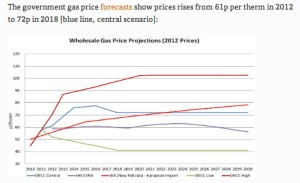Scotland should be wary of joining the Chancellor’s new ‘dash for gas’ through fracking. It is unlikely to lower energy prices, has environmental risks and diverts attention from the medium term need to develop renewable energy.
UK Energy Secretary, Ed Davey, has opened a new defence of fracking for shale gas by arguing that it could be ‘environmentally friendly’ if done properly. While “no silver bullet”, exploiting the UK’s reserves would be a good way of ‘weaning’ the nation off coal. He said:
“UK shale gas can be developed sensibly and safely, protecting the local environment, with the right regulation. And we can meet our wider climate change targets at the same time, with the right policies in place. Gas, as the cleanest fossil fuel, is part of the answer to climate change, as a bridge in our transition to a green future, especially in our move away from coal.”
However, his Lib Dem colleagues gathering in Glasgow, appear at odds with that line in a policy paper. This says they take a "very different approach to that advocated by the chancellor, which would increase the UK's reliance on gas, and particularly on unconventional sources, ie shale gas". They add: “There is no realistic prospect of a 'shale gas revolution in the UK."
Whatever the environmental concerns a key issue is the impact on energy prices. The chair of the UK Fuel Poverty Advisory Group, Derek Lickorish argues, “Ministers have a duty to promote the extraction of shale gas because it has the potential to drive down the cost of energy”.
However, the TUC’s Philip Pearson has highlighted the Deutsche Bank special report that says: “we do not expect the impact of shale-gas production on EU gas prices to be anywhere near as great as has been the case with US shale-gas production.”
Lets also not forget the politics. Osborne undoubtedly sees shale gas as his equivalent to Thatcher’s squandering of North Sea oil and gas. The huge failings of his economic policies can be massaged with this new resource. However, he has a couple of problems. As Rafael Behr points out in the New Statesman, shale gas in the Home Counties is not popular with the aging, nimby Tory party membership. Such grubby industries are usually reserved for the 'desolate' North, as a Tory minister said in an unguarded moment. In addition, Britain will miss even its current modest climate change targets. Our children are to be sacrificed for his re-election.
So what about Scotland? Earlier this year PricewaterhouseCoopers forecast that Scotland was in prime position to exploit up to £5 billion of natural gas reserves using fracking. The Tories in Scotland have argued that with our advanced oil and gas industry, “The prospect of expanding that industry into other parts of Scotland should be seen as the opportunity of a lifetime.”
In response, FoE Director Dr Richard Dixon said: “Scotland is so well placed with renewables it would be a terrible mistake to put political will and investment into shale gas when we should be concentrating on renewables. These claims that it will be clean, cheap and plentiful are all wrong.”
An added complication is that Dart Energy, whose plans to extract methane gas in Scotland have been brought to a standstill amid public opposition, has temporarily ceased trading on the stock exchange as it seeks more money from investors. Production at its core project at Airth, near Falkirk looks like being pushed back by around a year.
On balance, my own view is that Scotland should not join the Chancellor’s headlong rush into developing unconventional gas resources, including the use of fracking, because:
- there are still many uncertainties over the scale of viable reserves in Scotland and the UK as a whole;
- it seems unlikely that unconventional gas resources will have a significant impact on energy prices. UK costs are almost double those in the USA;
- the environmental consequences remain uncertain and a strict regulatory framework needs to be developed;
- further fossil fuel developments will do little to help Scotland meet our challenging emission targets;
- it could divert investment and research from renewable generation that is Scotland’s best long term prospect for sustainable energy; and
- public opinion is understandably hostile and local opinion should be respected at potential sites.
At best it might provide a partial alternative to insecure overseas supplies, but it isn’t a panacea and more work needs to be undertaken before such reserves are developed in Scotland.
Cross posted at Utilities Scotland
Cross posted at Utilities Scotland


No comments:
Post a Comment